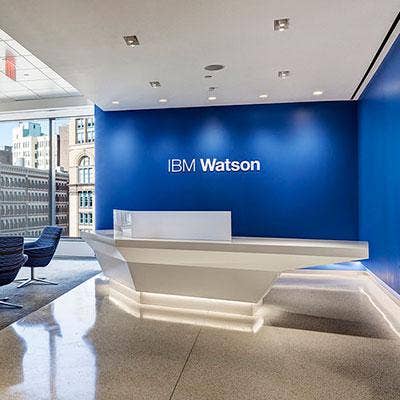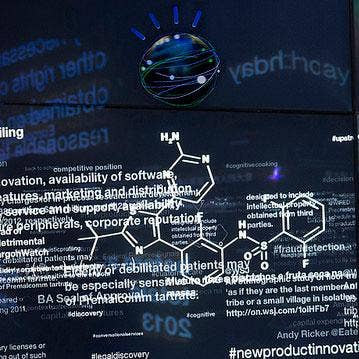10 Reasons Why IBM Watson Matters To The Channel

Watson Open For Business
IBM opened the doors this month to the New York City headquarters of its Watson Group, a division formally established in January with a $1 billion budget of which $100 million will go to venture funding.
The group is charged with growing Watson's ecosystem of cognitive computing applications, with its headquarters playing host to educational workshops and eventually incubator space for startups.
CRN last week spoke with Steve Gold, vice president of IBM Watson Group. Gold oversees global marketing for the group and is responsible for the ecosystem and partner programs, which includes the investment fund.
While the full implication of the group is still in the early stages of being understood, here's why Watson matters to the channel.

Big-Picture Change
Should the channel brace itself for major change because of Watson? No, Gold said. The implications are much more broad.
"Does it redefine the channel? No," Gold said.
Instead, the channel should see Watson and its various applications as a way to enhance, complement or augment what's already being done for end users.
"I think for us, for the channel, it opens up an opportunity to reach far deeper and more broadly to new markets and new industries," he said.

Product Differentiation
"It's interesting because I spent a good part of my career in the channel," Gold said, adding that the role of IBM for partners is helping them differentiate offerings and providing ease of use and access.
"The way I think about [Watson] from a channel perspective, this is not only a new tool, a new offering, this is a new way that allows me to think differently," he said. "It basically removes the shackles and constraints that have historically been put on me by the various means to market and allows me to think much more creatively."

Challenges Solved
Watson, Gold said, presents a very real way of addressing and responding to marketplace demands that have not yet been solved -- or perhaps even identified -- and that could mean different ways by which channel partners think and operate.
"This is actually going to be an eye-opening experience that [partners] are going to see things they've asked for for an extended period of time," he said.

The Numbers
Creating that eye-opening experience will require growing the Watson ecosystem, or the partner companies that are using the cognitive computing platform to build out their own apps aimed at various industries.
"Part of the fun is to amplify the effect and understanding of how a technology takes forms in different use cases in different industries," Gold said.
Watson's already got off to a strong start with 100 development partners and some 3,300 that have applied for the program.
"There were areas and opportunities that we hadn't even thought about," Gold said of Watson's industry applications.

Health Care's Growing Data Stack
How Watson could be used within health care is really where the company's researchers began in an attempt to tackle the challenges associated with the industry's ever-growing pile of data.
"Watson was really good at understanding large volumes of unstructured information," Gold said.
In fact, the computing system was capable of reading some 2 million pages of information and then coming back with responses to questions in less than three seconds.
"That industry is overwhelmed with the volume of information," Gold said of health care. "Medical data is doubling every five years. By 2018, it will be doubling every 18 months."

Less Daunting Prospects
But Watson doesn't just solve life-or-death challenges.
There is potential for it in places such as call centers and other less daunting places than health care, Gold pointed out.
That's quickly been realized in spaces such as retail and travel, including the Austin, Texas-based startup WayBlazer that aims to provide the next level of travel research via more personalized results.

Education Hub
Watson's headquarters at 51 Astor Place in New York City is expected to serve as a place for innovation to continue expanding the technology's use capabilities.
The program has qualities very similar to that of a tech incubator or accelerator program.
"Internal to IBM, we've committed over 500 subject matter experts to help partners and organizations evolve their thinking," Gold said.
That's because it's a different kind of technology, one that doesn't require programming or learning, for example, how to use a new drop-down menu.
"We're working with organizations to really kind of expand the ways in which they think their product could be consumed," Gold said.

What's At Stake
A multibillion-dollar business, really.
Watson presents a "shining beacon" for IBM, Gold said, although it's part of a much larger effort focused on reinventing the business.
"You have to constantly push the envelope and reinvent," he said. "You don't get­ to be a 100-year-old company and $100 billion business and not continue to have to be pushed for change, for the next big thing."

Facing Reality
Creating change and effecting a turnaround doesn't just mean adding new groups.
"[IBM] recognizes when it no longer is able to differentiate and add value and get out of that market. We also aren't afraid to divest the businesses that no longer embody the culture and spirit of what we stand for," Gold said.
IBM said this month it plans to pay GlobalFoundries $1.5 billion to take its semi-conductor business off its hands. That move, Gold said, "really speaks well to an organization's ability to recognize the need for change."
The focus now is "on things that truly we can be unique at and bring extraordinary value," Gold said.

What's Next, Watson?
Watson's first wave of partners is only just beginning to be brought to market.
"I think you're going to see things scaled faster [moving forward]," Gold said. "You're going to see us continue to accentuate and accelerate the physical presence of Watson in the market."
The group recently announced new languages that it's working with, including Japanese and Spanish -- and not just teaching Watson the translation, but actually getting the system to understand nuances.
"The ways in which Watson is being applied and consumed will get more creative and diverse," Gold said.